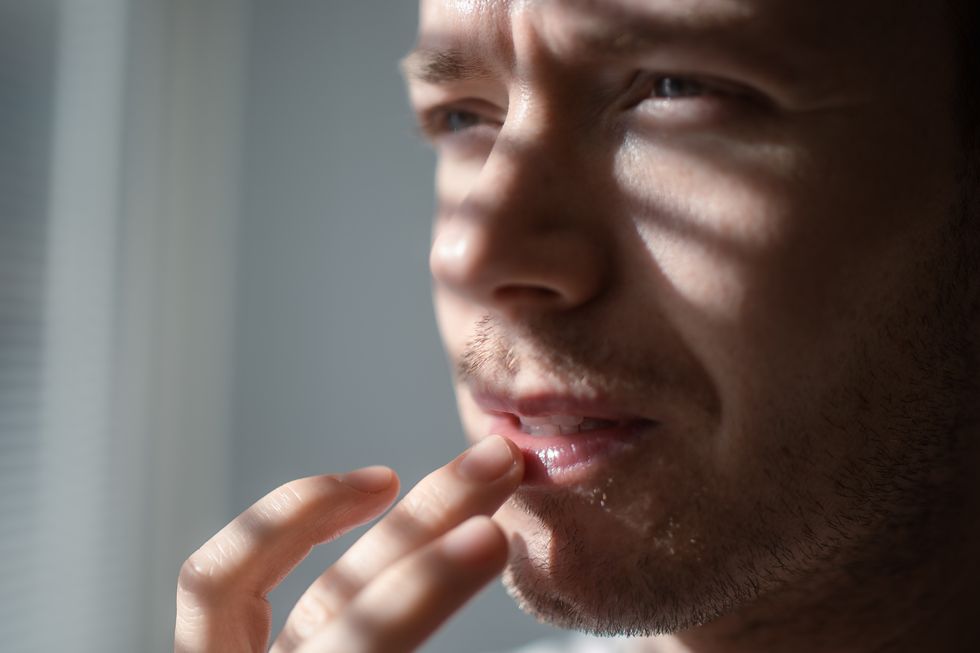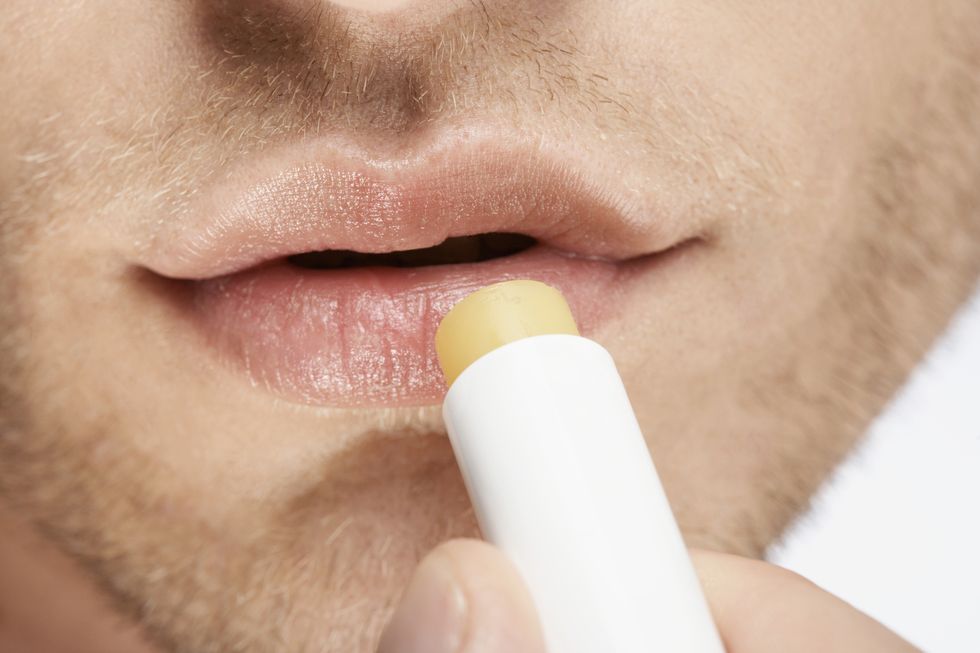Angular Cheilitis: Causes, Treatment, Prevention Tips - Men's Health
ARE MY LIPS just really chapped? Do I have cold sores? These questions probably come to mind when you notice painful cracks in the corners of your mouth. But, more than likely, this dryness and crusting is an inflammatory skin condition called angular cheilitis, or AC.
AC is commonly mistaken for cold sores. It can also resemble chapped lips, which is understandable, says Howard Rubin, M.D., a board-certified dermatologist at U.S. Dermatology Partners North Dallas.
"Although both are seen more frequently in the winter and colder, drier climates, angular cheilitis starts in the corners of the mouth and is usually bilateral," he explains. "AC may lead to fissures or cracks in the affected areas. Severely chapped lips are more often noted on the body of the lip."
AC is relatively common. Dr. Rubin says it's associated with excess saliva pooling in the corners of your mouth. When the skin on your lips, which is already thin and sensitive, comes in continuous contact with saliva, it increases dryness, irritation, and skin breakdown. So, licking your lips can make it worse.
The condition can be painful and pesky, says R. Sonia Batra, M.D., a board-certified dermatologist and founder of Batra Dermatology in Santa Monica, California. But the good news is AC isn't serious for most people. It often resolves without the need for medical intervention, but in some instances, you may need a dermatologist's help.
Wondering if AC is what's going on with your lips? Dermatologists explain what causes AC, what it looks like, and what to do about it.
What causes angular cheilitis?
Usually, an infection is to blame, Dr. Rubin says. It could be yeast (candida) or bacteria, like strep or staph. AC happens when the skin breaks down from a buildup of saliva, which makes the skin dry, cracked, and painful.
"When saliva breaks down and inflames skin at the corners of the mouth, the inflamed patches can become colonized by bacteria or yeast that usually reside in the mouth," Dr. Batra says.
The inflammation and cracking can open the door to painful sores, she says, and you might notice more pain when you open or close your mouth. In the most severe cases, some people have a bad taste in their mouths and difficulty eating. Sores can sometimes open and bleed if left untreated.
To alleviate the pain and dryness, you might lick your lips, but this worsens AC. "It causes more saliva buildup, which creates an ideal environment for bacteria or yeast to grow," Dr. Batra says.
What Angular Cheilitis Looks Like
Angular cheilitis typically starts with a red dry patch on the corners of the mouth. It can be on one or both sides, with a dry, scaly appearance, according to the Cleveland Clinic.
Maceration of the skin is common with AC—meaning the skin can soften and lighten in color, Dr. Batra says. If the skin gets too irritated, it can break apart and bleed. Other symptoms include:
- Blisters
- Cracking
- Crusting
- Redness
- Swelling
Left untreated, blisters can form as the skin at the corners of your mouth breaks down, which is why AC is sometimes confused with cold sores, Dr. Batra says.
"Visually, angular cheilitis appears in the corner of the mouth as cracked, scaly skin, while cold sores can occur anywhere around the mouth," she explains. "Usually, it looks like a cluster of small blisters that become crusted over the course of days."
But, with cold sores, you'll feel burning or itching on your lip before a blister forms, Dr. Batra says. AC doesn't give you a warning—until a sore appears.
Who's most at risk for AC?
Everyone, really—but, some people are more susceptible to AC than others.
Dr. Rubin says people with exaggerated skin creases around the mouth, because of aging or anatomy, might be more likely to get AC. Saliva is more likely to pool in these crevices, increasing the likelihood of inflammation.
Eczema and deficiencies in B vitamins, iron, or protein can exacerbate the condition, too, he adds. Certain medical conditions, such as anemia, diabetes, immune disorders, and some cancers put you at risk of AC. People with Down syndrome also have a higher risk.
Smokers, people with braces or ill-fitting dentures, people with sensitive skin, and those prone to drooling are also more vulnerable to AC.
The condition is also especially prevalent in the elderly. People in older age brackets "often have excess saliva due to dentures, loss of teeth, and vitamin deficiencies that increase their risk," Dr. Batra says.
Is angular cheilitis contagious?
AC is not contagious, Dr. Rubin says. You might get it on one side of your mouth and then the other, however, but it's unlikely to spread to other parts of your body or to others.
How to Prevent Angular Cheilitis
To limit the effects of saliva pooling in the corners of your mouth, use a lip balm, Dr. Rubin says. Lip balms will also help prevent it from coming back.
Other ways to prevent AC include not smoking, making sure dentures fit properly, avoiding licking your lips, and controlling your diabetes and other health conditions, he adds. Also, avoid contact with skin allergens or irritants.
How to Manage Angular Cheilitis Symptoms
If you notice the first signs of AC—a red patch in the corners of the mouth—take steps to address it, which will ease the discomfort and make it go away faster, Dr. Rubin says.
Start by keeping the area moist with a barrier cream, such as diaper rash cream or petrolatum, like Vaseline, he adds. Over-the-counter cortisone and antifungal cream, like Lotrimin, can help, too.
Avoid skin irritants as much as possible—these might include spicy foods or strong mouthwashes.
Reduce swelling by holding an ice pack or other cold compress on the sides of your mouth. If you spend a lot of time outside, use a face mask to avoid prolonged sun exposure, extreme cold, or wind.
When to See a Dermatologist
AC often resolves on its own, Dr. Rubin says. But, if you've had it for two weeks or more, even after you've tried OTC treatments, see a dermatologist.
They can prescribe an antifungal, cortisone, barrier cream, or antibiotic, he explains. Doctors will also rule out other skin conditions and identify the cause of your AC, which can help you prevent it.
"If you develop angular cheilitis, keep the inflamed area clean and dry to prevent the infection from worsening," Dr. Batra says. Left untreated, the infection could worsen and spread to the surrounding skin or cause oral thrush.
To prevent AC from occurring, stay hydrated, keep your lips dry, apply chapstick regularly, and practice good oral hygiene, Batra says. Also, stop licking your lips.
How long does it take for angular cheilitis to go away?
Angular cheilitis usually doesn't take long to clear up, depending on your treatment path.
If your doctor has prescribed a medication or topical cream, symptoms will typically clear up within two weeks, according to the Cleveland Clinic. Severe cases may take longer to heal, and there is a risk of scarring if AC isn't treated quickly.
Keep in mind, too, that AC can come back, so take steps to prevent it.


Comments
Post a Comment